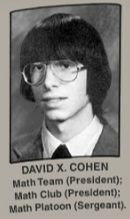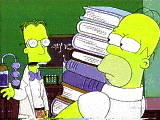|
David X. Cohen: Ah, the same question my parents asked in reference
to certain piles of tuition money that went out the window.
I always planned to be a scientist.
Both of my parents are biologists and my favorite
subjects in school were math and physics. (Go math team!)
At the same time, I liked to draw cartoons (which
I would force my sister to buy for a penny --
the beginning of my professional writing career), and
I wrote the humor column for my high school newspaper, and
later was a writer for the Harvard Lampoon Magazine. At some point, I had
a sudden panic when I realized that there was the option of trying to
write professionally, and that I had to make a choice. But I didn't --
instead I took a year off and worked at the Harvard Robotics Laboratory.
(I realize that my answer to this question is meandering... sorry. I'll try
to buckle down.)
Finally, I decided I should go to graduate school before I forgot
everything I knew, with the idea that I could try writing later if
I wasn't sure I had made the right choice. After three years of
graduate school, I felt I wasn't enjoying it as much as I should, and
that there was no end in sight, so I took a leave of
absence and began writing sample ("spec") TV scripts. After
a year or so of unemployment, this got me a job writing a couple early
episodes of Beavis and Butthead.
Later I got hired at The Simpsons, and
about 5 years after that, Matt Groening asked me if I wanted to work
on Futurama with him. Which I did, of course... |

Taken from the Season 2
Futurama DVD 2ACV06 |

